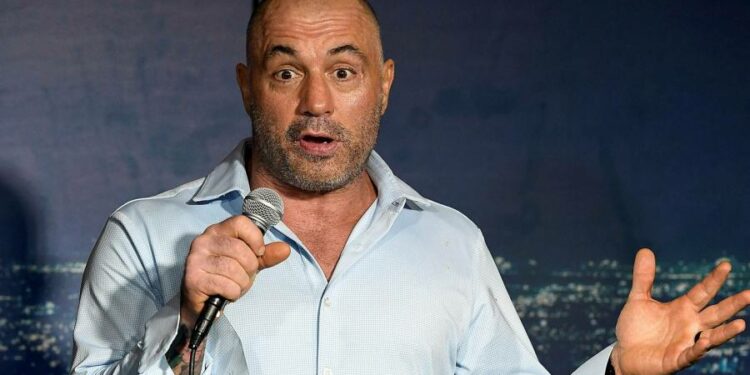Neil Young and Joni Mitchell have long been the voice of protest. The septuagenarian songwriters were still able to ignite a firestorm when they pulled their music off Spotify over the streaming service also hosting Joe Rogan. The pair, and hundreds of scientists and doctors, accuse the podcaster of peddling dangerous misinformation on his wildly popular show. Aptly, for someone who has extolled horse dewormer to fight Covid-19, Rogan has opened a can of worms when it comes to freedom of speech and the responsibilities of technology companies.
Rogan courts controversy. His guests include a joint-smoking Elon Musk, and the conspiracy theorist Alex Jones. But it was a recent episode with a virologist critical of using mRNA technology in Covid vaccines that sparked the ire of Young and Mitchell. Among other bizarre claims, Robert Malone falsely asserted that hospitals were financially incentivised to record deaths as caused by Covid-19. The podcast remains available on Spotify, which says it does not breach its guidelines.
Controversy sells, and it attracts clicks in our attention economy: Spotify paid Rogan $100mn in 2020 for exclusive rights to stream his Joe Rogan Experience, which before the deal boasted 11m listeners. It remains Spotify’s most popular podcast. His listeners are drawn by his persona as a self-styled freethinker interviewing those ignored or “cancelled” by mainstream media. Guests’ unfiltered hours-long rambles are framed as an opportunity for listeners to make up their own minds on everything from spearfishing to flashpoints in the culture wars.
The role of a plain-speaking outsider is contrived nonsense: Rogan is now one of the world’s most influential commentators. That ought to bring with it responsibilities that he and Spotify have been able to evade. Spotify’s initial position was that it was not its place to police Rogan’s content any more than it was to censor a rapper. That is disingenuous. Rogan’s exclusive relationship with the Swedish company makes it more analogous to a publisher than a neutral platform.
Spotify may unsurprisingly be loath to assume the responsibilities of a publisher. It is not alone among technology companies in trying to fight content moderation. Planned legislation in the UK and the EU would make social-media sites remove “harmful” content, which has sparked debate over whether Big Tech should be policing free speech. It is thornier in the US, which has a first amendment right to free speech and also partisan traditional broadcasters, where similar views to Rogan’s are aired nightly.
But Spotify’s contract with Rogan is not akin to Facebook having to moderate billions of users’ posts. Providing fact-checkers to help him better directly challenge guests would not make for censorship. In the wake of the row, which has not helped its share price, Spotify said it would issue a “content advisory” to podcasts discussing Covid-19, pointing to facts from “trusted sources”. That is a half-step forward. Spotify’s algorithms, which after searching for Rogan then suggest podcasts in a similar mould, should promote a broader range of opinion.
This is not to argue for banning Rogan’s podcast; challenging the orthodoxy is healthy. As he points out, once-fringe theories about coronavirus are now mainstream. But by his own admission in a 10-minute apology, he can do better. His proposed remedies include researching controversial topics and presenting dissenting opinions to his guests. That is the minimum any responsible mainstream publisher or broadcaster would be obliged to do. It is editing, not censorship.











